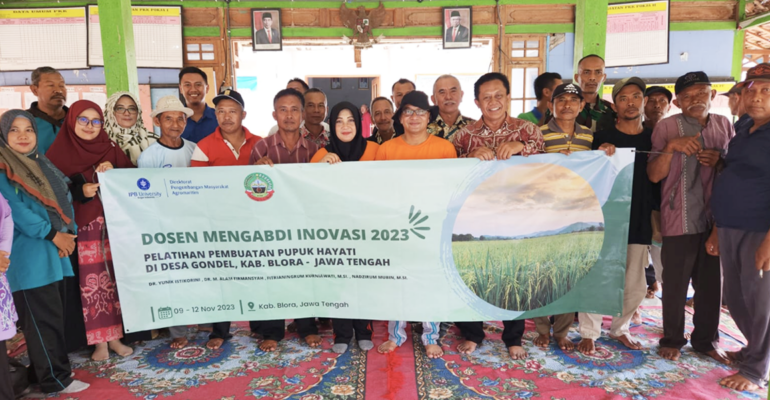IPB University Young Lecturer Introduces Dangers of Important Pests and Diseases in Rice Production Center Villages

Recognition of pests and diseases is the first step that must be known before control measures are implemented. Various types of pests and diseases are indeed difficult and make some people reluctant to know about them. In fact, by knowing pests and diseases in advance, control techniques can be carried out in a targeted manner.
Young IPB University lecturers Fitrianingrum Kurniawati, MSi and Nadzirum Mubin, MSi (Department of Plant Protection) together with Dr Yunik Istikhorini (Department of Silviculture) took action. Through the Lecturer Serving Innovation (DMI) program, the three of them are trying to introduce the dangers of important pests and diseases to rice plants in Gondel Village, Kedungtuban, Blora, Central Java.
Nadzir, as this young lecturer is known, in his presentation explained that the slogan ‘if you don’t know it, you can’t control it’ is very important. Often because of ignorance, farmers immediately repel pests or diseases using synthetic fertilizers and pesticides. Even though the plants are not necessarily demanding.
“Harvest failure is not solely due to a lack of fertilizer, not solely because the climate is changing. Pest and disease attacks also have their own role in reducing rice production in rice fields,” he explained during the Lecturer Service for Innovation activity at the Gondel Village Hall Office (10-11/11).
In fact, Nadzir said that attacks by the brown planthopper with the scientific name Nilaparvata lugens Stail (Hemiptera: Delphacidae) can cause puso or crop failure. The entire plant dries up because it is attacked by these pests.
Apart from that, according to Fitrianingrum, disease is no less important to know. White shoot, for example, is a disease caused by the nematode Aphelenchoides besseyi. This disease shows typical symptoms in the form of chlorosis on the tips of the leaves. These symptoms are often confused with symptoms of calcium and magnesium deficiency.
“Pest and disease control needs to be done, but making plants healthy and recovering quickly is very important. Just like humans who are sick, healing the disease from within or by increasing the body’s immunity can work longer and sustainably compared to just adding instant stimulants and controlling ingredients,” explained Pipiet.
Furthermore, Dr Yunik Istikorini said, biological fertilizer with organic base ingredients and added with potential microbes such as Trihcoderma, Gliocladium, Azotobacter and others is one effort that can be applied in the field.
“Aside from being a biofertilizer, biostimulant and biopesticide, biological fertilizer can also act as a bioinducer or immunity enhancer in plants,” she said.
Lecturers Serving Innovation is a program of the Directorate of Agromaritime Community Development at IPB University. This program is an effort to disseminate technology and innovation to the community.
This activity was attended by H Arief Rohman, SIP, MSi (Regent of Blora), Rajiman, SIP, MSi (District Head of Kedungtuban), Suko Hadi Wiyono, AMd (Head of Gondel Village), Gondel Village Farmers Group and Family Welfare Empowerment (PKK) women, Kedungtuban District. (*/Rz) (IAAS/RZL)



